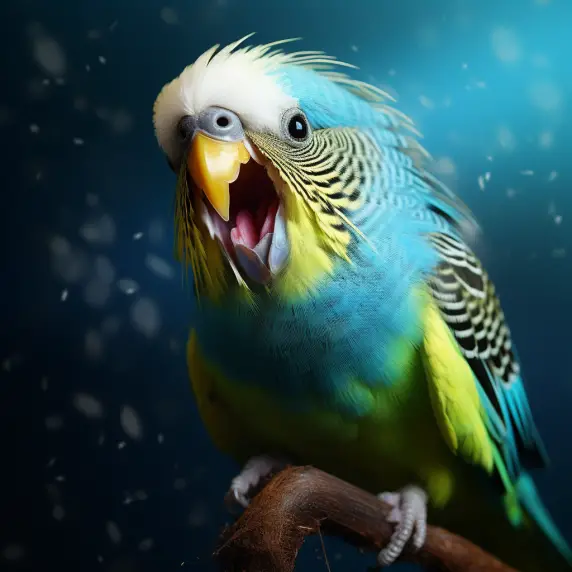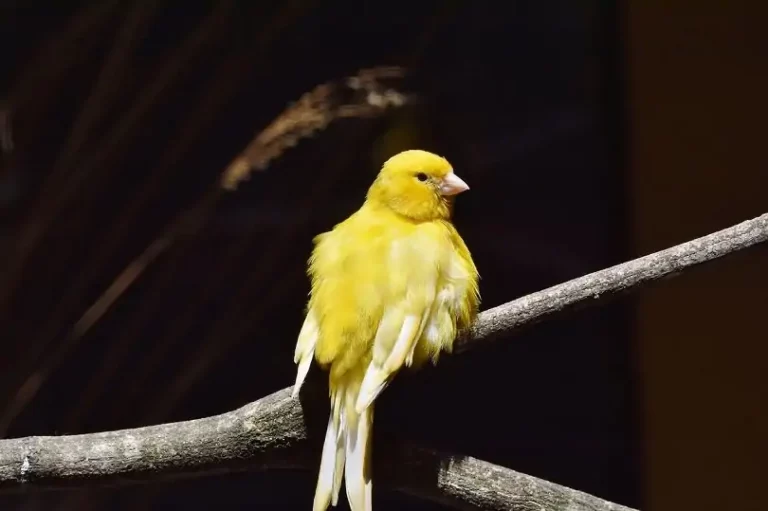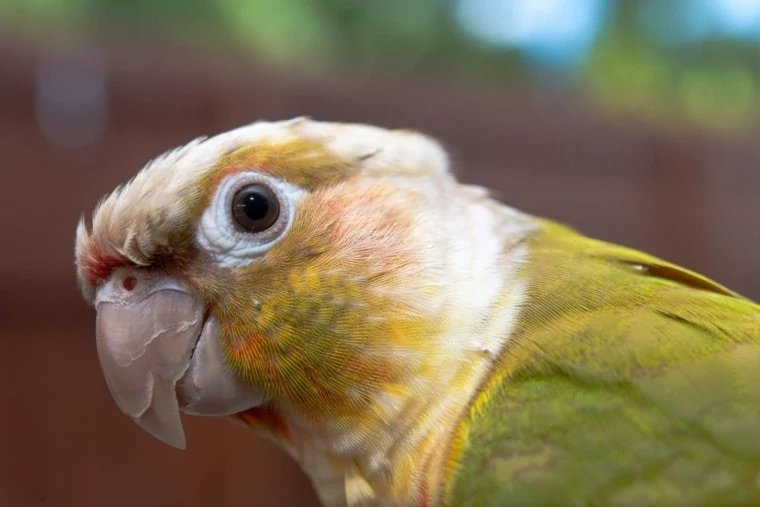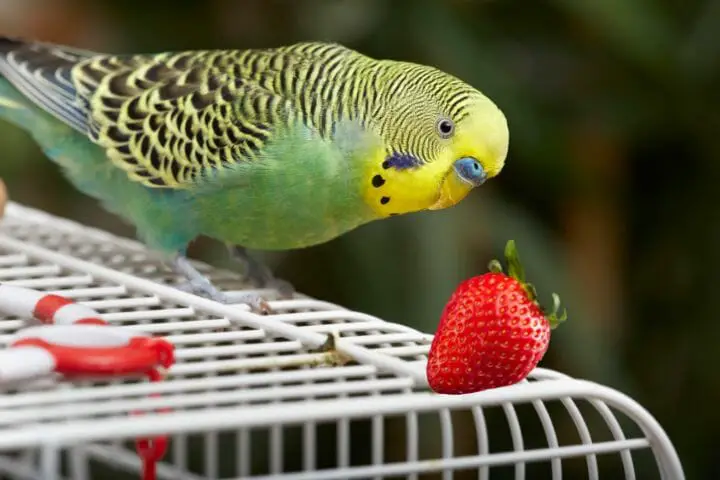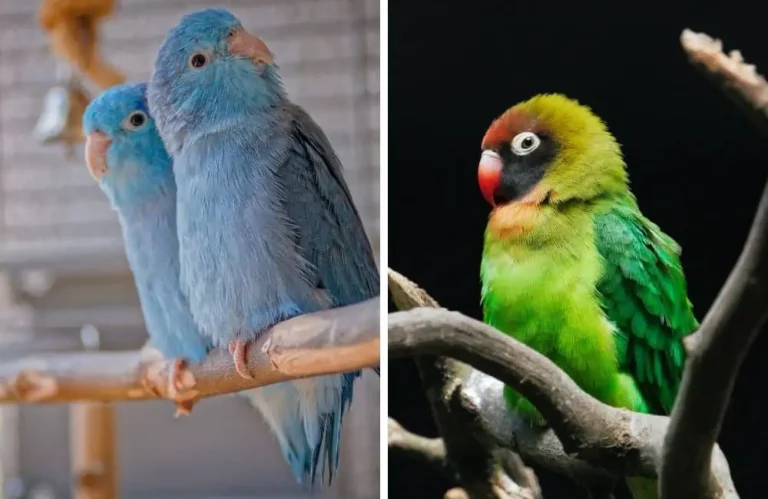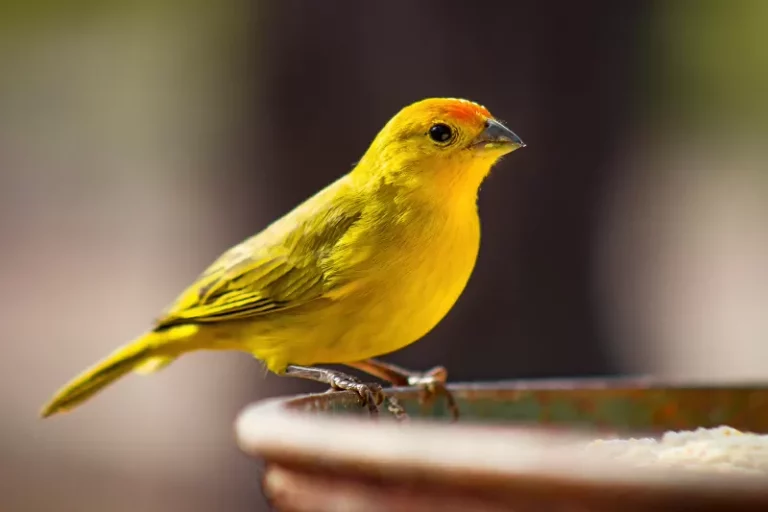5 Popular Types of Conure Birds 🦜
Conures are small to medium-sized parrots native to Central and South America. With their vibrant colors and playful personalities, they make excellent pets. In this blog post, we’ll explore various types of conure birds, their characteristics, and tips for their care.
Key takeaways
Sun, Green-Cheeked, Jenday, Blue-Crowned, and Nanday Conures are popular pet choices.
Conures are known for their vibrant colors, intelligence, and social nature.
Conure birds are native to Central and South America and come in over 40 different species.
A balanced diet, including pellets and fresh fruits and vegetables, is essential for conure health.
Spacious cages, regular socialization, and mental stimulation promote well-being and happiness.
Positive reinforcement training is effective for teaching conures new behaviors and tricks.
Regular avian veterinarian check-ups help maintain optimal health for your conure.
5 Popular Types of Conure Birds
1) Sun Conure
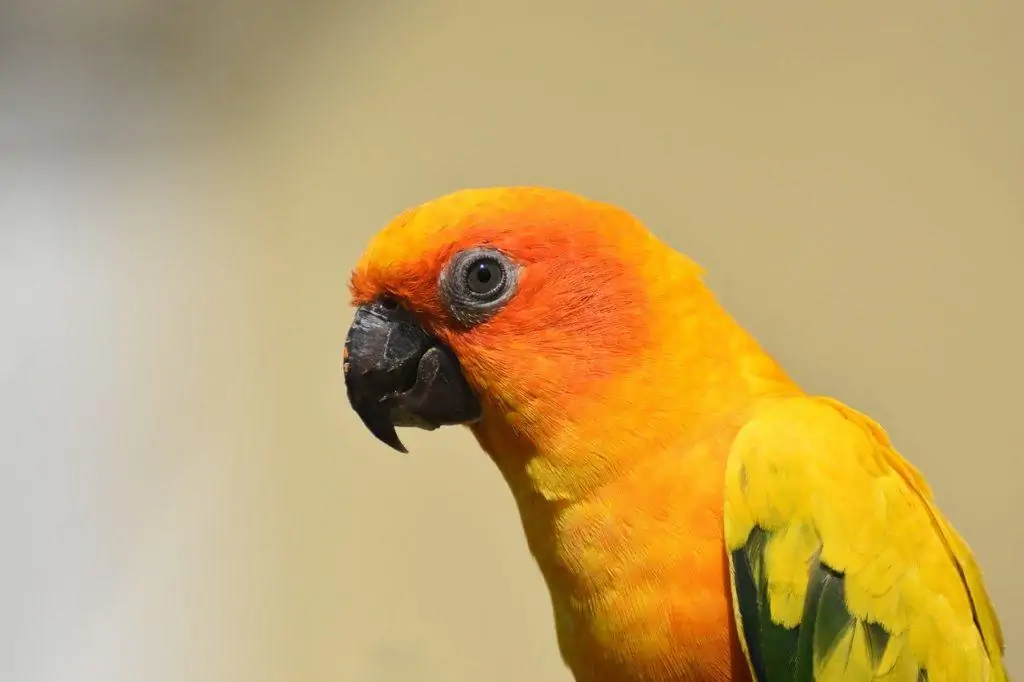
Sun Conures are well-known for their stunning and vibrant orange and yellow coloring, which resembles a beautiful sunrise. They have green wings and blue tail feathers that add to their striking appearance.
Sun Conures are known for their social and affectionate nature, making them beloved pets. However, they can also be quite loud, so they may not be suitable for people living in apartments or those sensitive to noise.
2) Green-Cheeked Conure
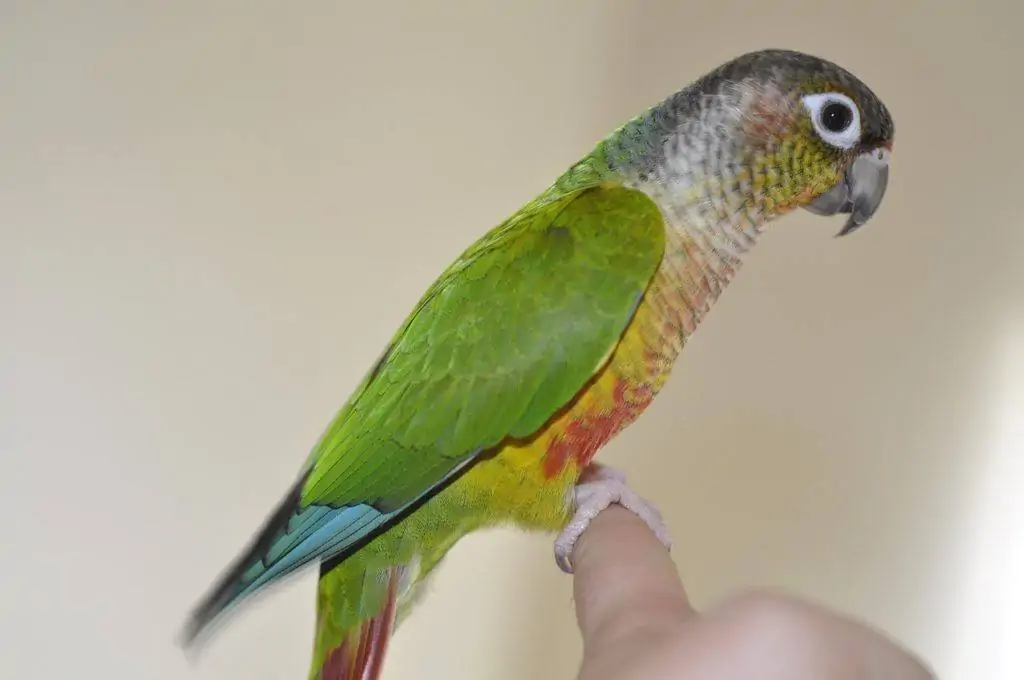
Green-Cheeked Conures are a popular choice among conure enthusiasts due to their quieter nature compared to other conure species. They have a primarily green body, with a red tail and grayish-blue feathers on their chest.
They are known to be affectionate, intelligent, and playful birds that enjoy interacting with their human companions. Green-Cheeked Conures can also learn to mimic a limited number of words and sounds.
3) Jenday Conure
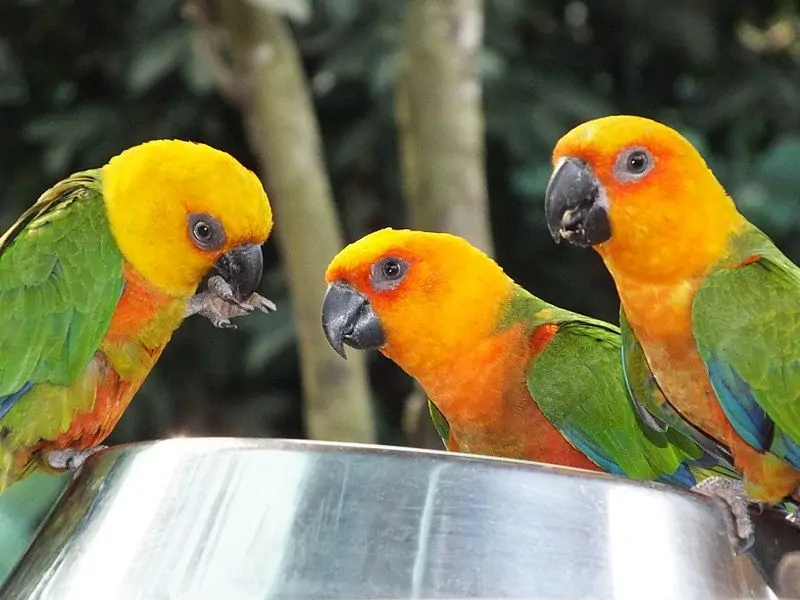
Closely related to the Sun Conure, the Jenday Conure sports a combination of yellow, orange, and green coloring, making them an eye-catching addition to any home. Jenday Conures are playful and energetic, enjoying a variety of toys and activities to keep them occupied.
They are also quite social and form strong bonds with their caregivers. Like Sun Conures, Jenday Conures can be noisy, which is important to consider when choosing a pet bird.
4) Blue-Crowned Conure
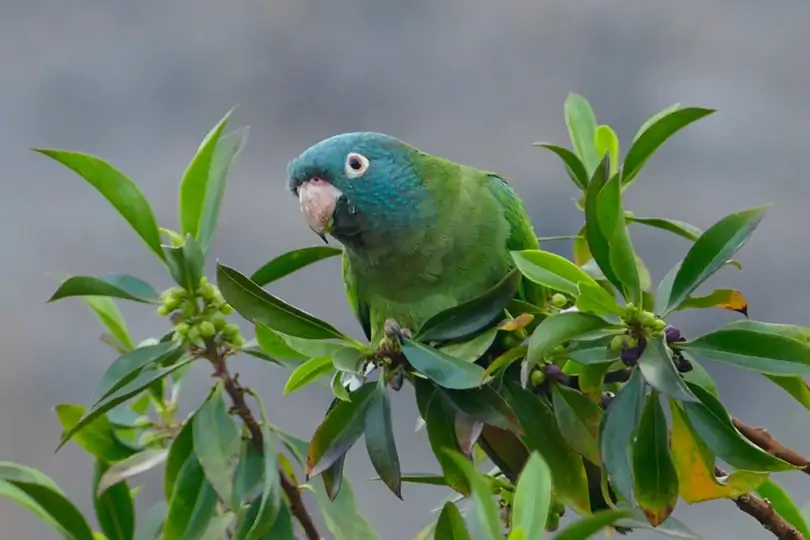
Blue-Crowned Conures get their name from the striking blue crown on their head. Their bodies are primarily green, with blue feathers around their eyes and a reddish tail. These conures are known for their intelligence and talkative nature.
They can learn to mimic speech and various sounds, making them an entertaining companion. Blue-Crowned Conures are relatively quieter than Sun and Jenday Conures, but they still enjoy socializing and interacting with their human family members.
5) Nanday Conure
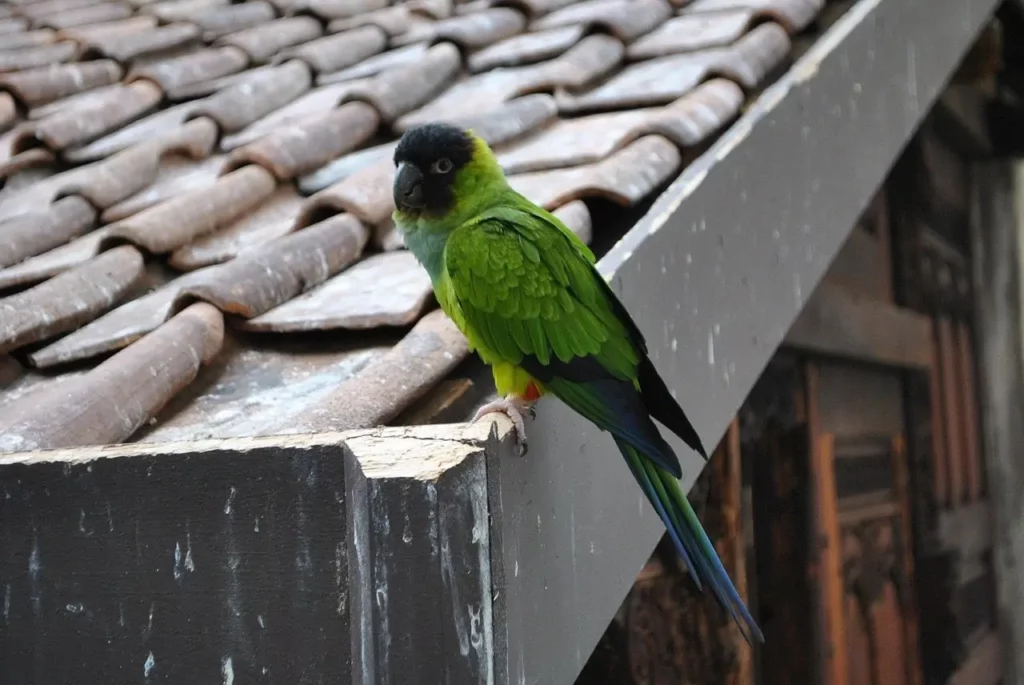
The Nanday Conure is easily recognizable by its black head, green body, and blue feathers on the wings and tail. These birds are known for being social and intelligent, making them engaging pets for those who can dedicate time and attention to their care.
However, Nanday Conures can be quite noisy, so they may not be the best choice for people who prefer a quieter environment.
Understanding Conure Birds
Origin and Habitat
Conure birds are native to Central and South America, where they can be found in a variety of habitats ranging from dense rainforests to open grasslands and savannas. The diverse environments they inhabit contribute to the unique traits and characteristics of each species.
Physical Features
Conures are small to medium-sized parrots, usually measuring between 10 to 20 inches in length, including their long, slender tails. One of the most striking features of these birds is their brightly colored plumage, which can include a mix of vibrant hues like green, blue, yellow, orange, and red.
They also have strong, curved beaks that allow them to crack open seeds and nuts, and zygodactyl feet, with two toes pointing forward and two pointing backward, which help them to easily grip branches and perches.
Behavior and Temperament
Conures are known for their playful, social, and affectionate nature. They are intelligent and curious birds that enjoy exploring and interacting with their environment. Many conure species can learn to mimic sounds, including human speech, although they may not be as skilled as some larger parrot species.
Conures can also be quite vocal, with some species being louder and more talkative than others. When properly socialized, conures can form strong bonds with their human caregivers and can make wonderful companions.
Conure Species Diversity
There are over 40 different species of conure birds, each with its own unique characteristics and features. In this blog post, we will focus on some of the most popular types of conure birds that are commonly kept as pets.
While they may share many similarities, it’s essential to understand the specific needs and traits of each type to provide the best possible care for your feathered friend.
Caring for Your Conure Bird
Diet and Nutrition
A balanced diet is essential for the health and well-being of your conure bird. A high-quality pelleted diet should make up the majority of their meals, as it provides essential nutrients in the correct proportions.
Supplement the pelleted diet with a variety of fresh fruits and vegetables to provide additional vitamins and minerals. Occasional treats, such as seeds and nuts, can be offered in moderation, but avoid high-fat or high-sugar foods. Always provide fresh, clean water for your conure to drink.
Housing
Conure birds require spacious cages that allow them to move around and stretch their wings comfortably. The cage should have horizontal bars for climbing and multiple perches of varying thicknesses, textures, and materials to promote healthy foot development.
Toys that encourage play, foraging, and shredding will help keep your conure mentally stimulated and engaged. Clean the cage regularly to maintain a sanitary environment and prevent the buildup of harmful bacteria.
Socialization and Enrichment
Conures are social birds that thrive on interaction with their human caregivers and, in some cases, other birds. Regular socialization helps prevent boredom, stress, and the development of unwanted behaviors.
Encourage bonding and trust by spending time with your conure each day, talking to them, and offering gentle physical contact. Provide a variety of toys and rotate them regularly to keep your conure’s environment interesting and stimulating.
Training
Training is an essential part of responsible conure care, as it helps establish boundaries and strengthens the bond between you and your bird. Positive reinforcement training, using treats and praise, is the most effective method for teaching conures new behaviors and tricks.
Be consistent and patient with your training sessions, and always end on a positive note to encourage your conure’s progress.
Health and Wellness
Regular health check-ups with an avian veterinarian are crucial for keeping your conure in optimal health. Be vigilant for signs of illness, such as changes in behavior, appetite, or droppings, and seek veterinary care if you have any concerns.
Maintaining a clean environment, providing a balanced diet, and offering mental and physical stimulation will all contribute to your conure’s overall health and happiness.
Frequently Asked Questions
How long do conure birds live?
With proper care, conure birds can live between 15 and 30 years, depending on the species.
Are conure birds good pets for families with children?
Conures can be good family pets if they are well-socialized and handled gently. They may not be suitable for very young children due to their potential for nipping and their sensitivity to loud noises.
What kind of cage should I get for my conure bird?
A conure’s cage should be spacious enough for them to move around comfortably, with horizontal bars for climbing. Include perches of different thicknesses, textures, and materials to help maintain foot health. Add toys for mental stimulation and shredding.
Do conure birds need a companion?
While conures are social birds and may benefit from having a companion, they can also bond closely with their human caregiver. If you can provide ample attention and interaction, a single conure can be a happy, well-adjusted pet.
How can I tell if my conure bird is sick?
Signs of illness in conures include lethargy, loss of appetite, changes in droppings, weight loss, or unusual behavior. If you suspect your conure is sick, consult an avian veterinarian for diagnosis and treatment.
Conclusion
Conure birds are captivating and engaging pets, thanks to their bright colors, intelligence, and social nature. By understanding the different types of conure birds and their specific needs, you can ensure that your feathered friend thrives in your care.
Providing a balanced diet, proper housing, mental stimulation, and regular socialization are all essential components of responsible conure care. With dedication and love, you can enjoy a long-lasting bond with your conure, making them a cherished companion for years to come.
References:

